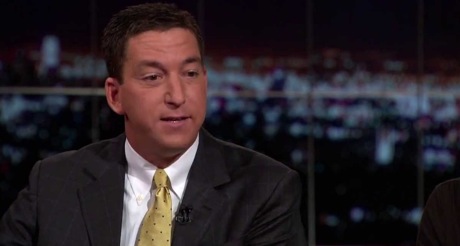Glenn Greenwald, his newspaper The Guardian, and The Washington Post, received the Pulitzer Prize for public service for reporting of the NSA spy scandal—which came to light because of the whistleblowing activities of Edward Snowden.
American journalism’s abject failure in informing the public of the most important stories of our time is undeniable.
On Sunday’s CNN “Reliable Sources” program, Greenwald said he found the award “really gratifying.” To learn that it was the public service award and that it was given to The Guardian and to The Washington Post for the work that we have done was really gratifying,” said Greenwald. “Because I think that is what the ideal was that we always tried to fulfill, which was doing the reporting in the public service.”
It is no doubt a satisfying time for Greenwald who, only a few days earlier, won the prestigious Polk Award given by Long Island University. In both cases, the reporting of the NSA’s spying on average Americans was what won him two of journalism’s greatest prizes. And the man central to that story is Edward Snowden.
Mr. Snowden is now a pariah among Washington’s political establishment because of his surreptitious stealing and leaking of secret documents detailing the extent of the government’s domestic spy program. After the Pulitzer decision, Snowden said “Today’s decision is a vindication for everyone who believes that the public has a role in government. We owe it to the efforts of the brave reporters and their colleagues who kept working in the face of extraordinary intimidation, including the forced destruction of journalistic materials, the inappropriate use of terrorism laws, and so many other means of pressure to get them to stop what the world now recognizes was work of vital public importance.”
Snowden is now in Russia where he has gained political asylum—amid calls for his head to be delivered on a silver platter. Among those who want Snowden tried as a traitor is New York Republican Representative Peter King who is also unhappy with the reporting of Greenwald. Reacting to the awarding of the Pulitzer, Mr. King said “awarding the Pulitzer to Snowden enablers is a disgrace.”
Greenwald said he would wear King’s negative comments as “an enormous badge of courage.” He also added “That’s part of, I think, what journalism is, is if you want to be adversarial to those who wield power, you have to expect that those who wield power aren’t gonna like what you do very much.”
Unfortunately, this essential understanding of what journalism should be—especially, in relation to those in power—is now, largely, the exception to the rule in American journalism. Very few contemporary journalists and media organizations have the stomach for challenging those in power. Instead, many press people prefer to suck up to power—and the public is paying the price for it.
Over the last 14 years, American journalism has repeatedly failed in properly telling the most important stories of the day. The new millennium started with failures in covering stories like what really happened in Florida during the 2000 Presidential Elections and by the inadequate reporting regarding the Iraq War. And to close out the decade, American journalism failed to expose the architects of the Wall Street crash of 2007-2008.
American journalist Greg Palast did exemplary work in illustrating that the vote and voice of Black Floridians were silenced—in a state where George Bush’s brother was governor. Yet, except for appearances on the late Gil Noble’s “Like It Is” television program and Amy Goodman’s “Democracy Now,” Palast was not given a hearing in American broadcast media circles. However, Palast’s findings were circulated, with the help of the BBC, across Europe—much like U.K.’s The Guardian assisted with the reporting of Greenwald.
In America, many journalism “experts” give ample lip-service to the so-called concept of “objective journalism.” During the time the decision was made to go to war with Iraq, where was this so-called “objective journalism” being practiced? Where was the thoughtful analysis and insightful reporting to tell us what war with Iraq had to do with 9-11 attacks or terrorism? Instead, journalists became jingoists for war—and reporters like Judith Miller were used as propaganda disseminators.
Much the same thing happened when establishment media never critically reported on the Obama White House’s involvement in Libya—where, as a result of NATO’s intervention, ruthless terrorists are now controlling army bases and kidnapping people. The Black population were targeted for killing and their city of Tawargha is now ethnically cleansed.
We also had the scandalous Valerie Plame affair, where forces in the Bush White House exposed the name of this CIA officer to punish her husband. Some big names in journalism were found to be involved in some fashion with this story including: Judith Miller, Bob Woodward, Tim Russert, Walter Pincus, Matthew Cooper and Bob Novak. Tellingly, administration officials seemed confident they could manipulate these journalists to out Plame—and in fact Mr. Novak did just that by writing a column and publishing her name.
Sadly, America’s establishment media is often used to do Washington’s dirty work. This is partly why whistleblowers no longer trust establishment reporters. Outlets like Wikileaks are now regarded as more trustworthy by many who have stories to tell about abuses in government.
The country is still in the midst of an economic downturn created by wealthy Wall Street shysters who conned many out of their hard-earned money and assets wrecking the economy in the process. Yet, establishment media failed to fully expose the main miscreants of these misdeeds. Just like government, the press has given Wall Street robber barons a pass. Crime certainly does pay if you’re wealthy on Wall Street.
Muckraking journalism against the powerful seems anathema to today’s journalists. Jimmy Breslin, the great American reporter and columnist, once said he didn’t accept personal party invitations from powerful politicians and people—because he didn’t want his reporting to be co-opted by their influence. Breslin cared more about truthful reporting than rubbing shoulders with political prevaricators.
Today’s establishment journalists are often afraid to offend politicians—so serious truth-telling is usually omitted from media conversations. Issues like economic inequality, police brutality and civil rights are never addressed with the comprehensive analysis they require.
The issue of domestic spying isn’t a new one—especially, to African-Americans who’ve been spied on ever since being brought to this country. Many African-Americans know that the FBI’s COINTELPRO program targeted Black individuals and groups—like: Paul Robeson; Dr. Martin Luther King Jr.; Malcolm X; SNCC; and the Black Panthers.
However, many other people entertainers and sports figures were also monitored as well. “Big brother” has always been watching brothers and sisters.
All governments seek to control the people—because of their fear of revolutionary upheaval and being overthrown by people power. We’re now in the midst of the rising surveillance state of America. Ever wonder why so many cameras are really being installed on the streets and highways?
The rapid technological advancements of our time made it much easier for government to intrude in the lives of the citizenry. The Fourth Amendment right of Americans is fast becoming obsolete. The Digital Age has made many things possible for the average person. However, governments are also busy using the Internet, e-mail and smart phones to invade our privacy.
We should expect the government to do that. They always have. But shouldn’t we also expect those who’re supposed to represent the so-called “Fourth Estate” to champion the public’s interests by exposing those in government that are infringing on the rights of the people?
Much of establishment media have surrendered.


















